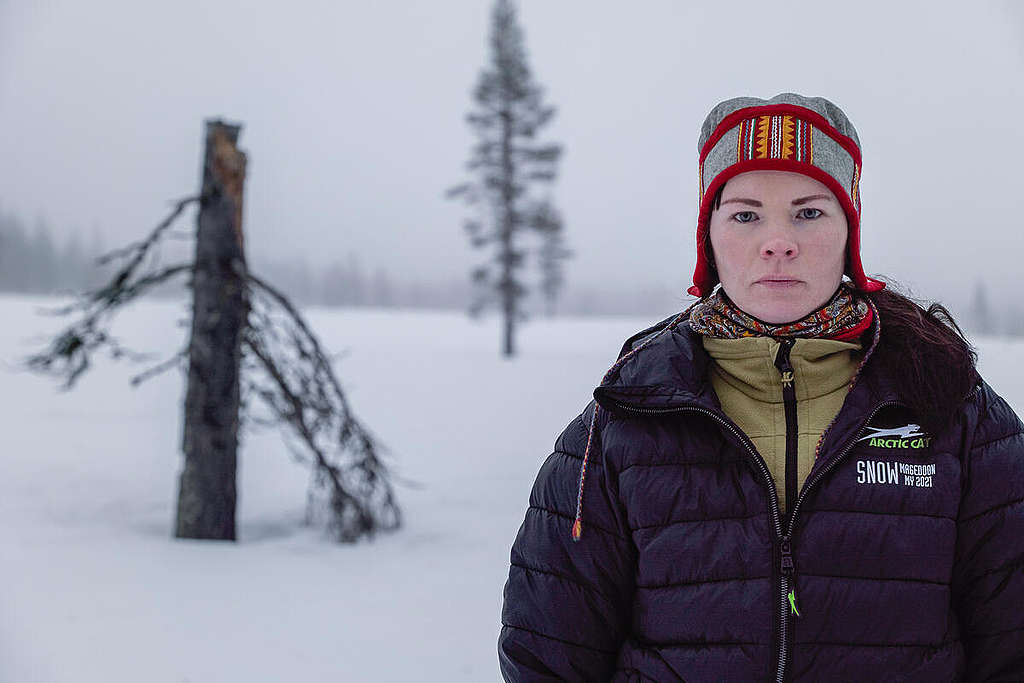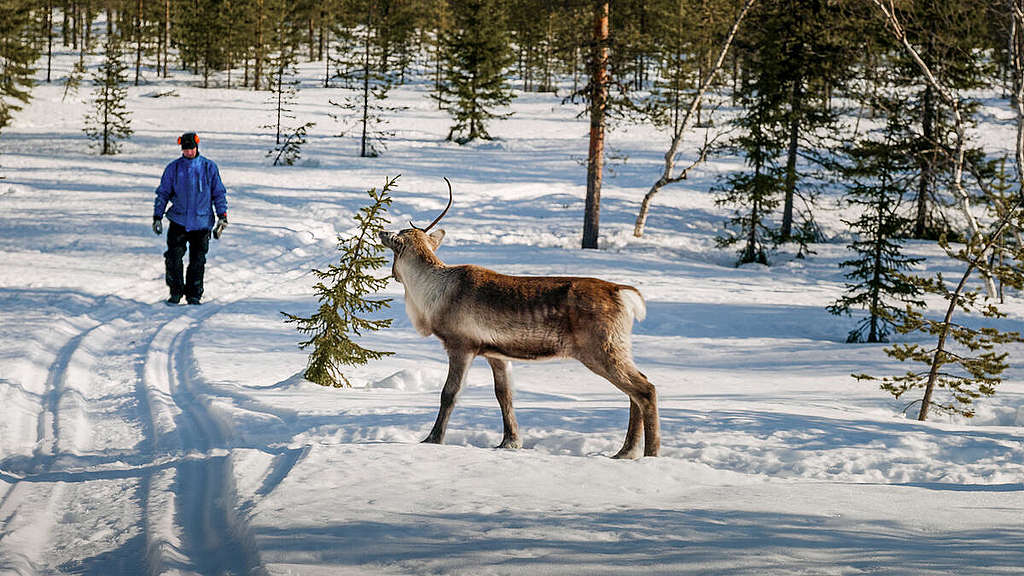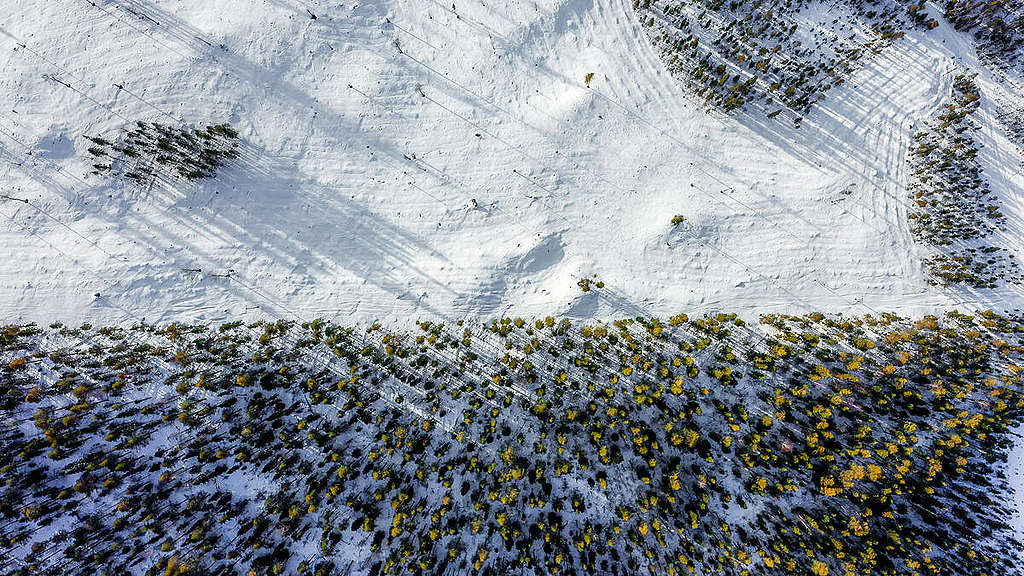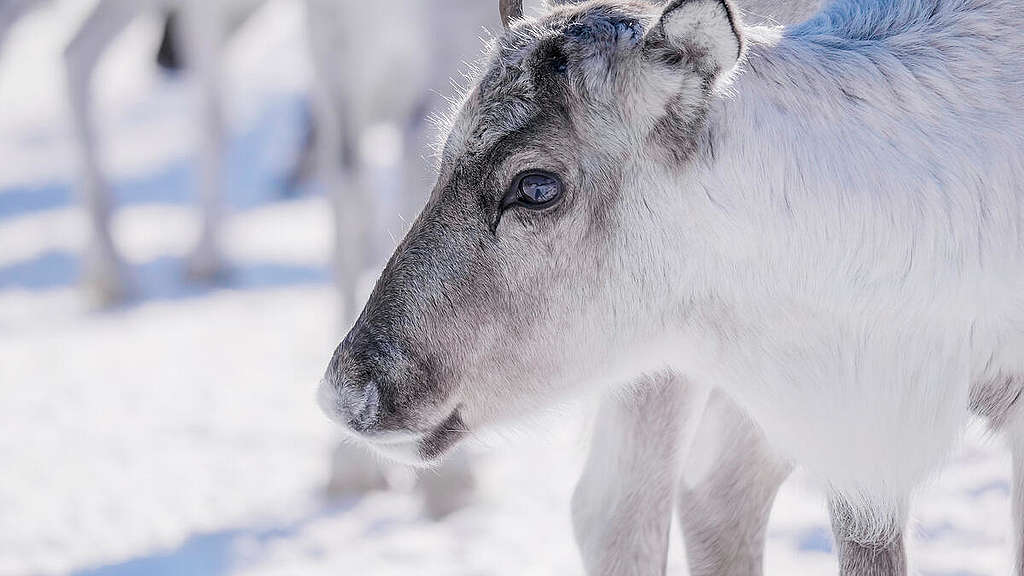Katarina Sevä 20 April 2021
Reindeer herding is not just a profession. It is something you live with around the clock and all year round, generation after generation. Our families have lived in these lands and have been continuously carrying on with forest Sámi reindeer herding for many hundreds of years.

Katarina Sevä, reindeer herder, member of the Council of Mounio Sámi reindeer herding district. © Rasmus Törnqvist / Greenpeace
But in recent years, the land needed for reindeer herding has decreased more and more, due to extensive logging. This affects the reindeer directly. The food disappears. The vital hanging lichen – the emergency feed – is becoming increasingly rare. You can see how the reindeer have changed in recent years. Their antlers have become worse and the average weight of the reindeer has decreased. The behavior of the reindeer is changing. It’s devastating – and it’s awful to see. If the forests were to disappear, then there is no future for the reindeer and reindeer husbandry at all.
But in recent years, the land needed for reindeer herding has decreased more and more, due to extensive logging. This affects the reindeer directly. The food disappears. The vital hanging lichen – the emergency feed – is becoming increasingly rare. You can see how the reindeer have changed in recent years. Their antlers have become worse and the average weight of the reindeer has decreased. The behavior of the reindeer is changing. It’s devastating – and it’s awful to see. If the forests were to disappear, then there is no future for the reindeer and reindeer husbandry at all.

Ronny Nyström, Reindeer herder, former forestry negotiator, Mounio Sámi reindeer herding district. © Rasmus Törnqvist / Greenpeace
Although we have used these forests for centuries, most of them are today held by the state owned forest company Sveaskog. A couple of years ago, we still had regular consultations with Sveaskog, which we have had for decades. Unfortunately, they abruptly terminated these meetings with us. We received no sensible explanation, only oral information about the message.
We have said “no” to logging in important areas and we have shown the importance of these areas. But Sveaskog shows us no consideration at all, they just cut the forests. We can say nothing about it. We do not even get maps of where they plan to log. They come here and make new forest roads in the area, chopping down forests that can be important to us. They have also logged forests that we have previously agreed must be kept, because they are so important for reindeer grazing.
Although we have used these forests for centuries, most of them are today held by the state owned forest company Sveaskog. A couple of years ago, we still had regular consultations with Sveaskog, which we have had for decades. Unfortunately, they abruptly terminated these meetings with us. We received no sensible explanation, only oral information about the message.
We have said “no” to logging in important areas and we have shown the importance of these areas. But Sveaskog shows us no consideration at all, they just cut the forests. We can say nothing about it. We do not even get maps of where they plan to log. They come here and make new forest roads in the area, chopping down forests that can be important to us. They have also logged forests that we have previously agreed must be kept, because they are so important for reindeer grazing.

Aerials of forest and clearcuts in Mounio Sámi community. © Rasmus Törnqvist / Greenpeace
Sveaskog has treated us very abusively – and still does. This haunts us daily. We have made demands to Sveaskog. We have written letters from Sámi reindeer herding district, where we demand that we should have consultations back and that some forests must be saved. But we have not been heard. It’s awful that a state-owned company can do that.
We have seen with our own eyes how fast the logging goes on and feel a strong concern for the future. The reindeer and we who work with reindeer husbandry are completely dependent on the forest. If we lose the few small areas of hanging lichen forests that we have left, it is the end of reindeer husbandry. What should we do if the forest is lost? What will the reindeer live on? Where will we go?Reindeer in Mounio Sámi community.
Sveaskog has treated us very abusively – and still does. This haunts us daily. We have made demands to Sveaskog. We have written letters from Sámi reindeer herding district, where we demand that we should have consultations back and that some forests must be saved. But we have not been heard. It’s awful that a state-owned company can do that.
We have seen with our own eyes how fast the logging goes on and feel a strong concern for the future. The reindeer and we who work with reindeer husbandry are completely dependent on the forest. If we lose the few small areas of hanging lichen forests that we have left, it is the end of reindeer husbandry. What should we do if the forest is lost? What will the reindeer live on? Where will we go?Reindeer in Mounio Sámi community.

© Rasmus Törnqvist / Greenpeace
Sveaskog is the state’s own forest company – and is governed on the basis of what the Swedish parliament and the government decide. They must consult with the reindeer herding area – this is an absolute minimum. We demand that Sveaskog immediately stop all logging in Muonio Sámi reindeer herding district until they restart consultation with us again.
Katarina Sevä is a reindeer herder and board member of Muonio Sámi reindeer herding district
Please support our call to protect Indigenous lands from logging, here: https://act.gp/3gqtFkW
Sveaskog is the state’s own forest company – and is governed on the basis of what the Swedish parliament and the government decide. They must consult with the reindeer herding area – this is an absolute minimum. We demand that Sveaskog immediately stop all logging in Muonio Sámi reindeer herding district until they restart consultation with us again.
Katarina Sevä is a reindeer herder and board member of Muonio Sámi reindeer herding district
Please support our call to protect Indigenous lands from logging, here: https://act.gp/3gqtFkW
Swedish state-owned forest company accused of abusing Sámi rights
Greenpeace International 20 April 2021 |
Stockholm, Sweden, 20 April, 2021 – Sweden’s largest forest company, state-owned Sveaskog, has repeatedly ignored Sámi rights and logged old growth forest on ancestral lands vital to reindeer herding around Muonio Sámi reindeer herding district in Sweden’s north. Sveaskog has also stopped all consultation processes with the community. The Muonio Sámi reindeer herding district and Greenpeace Sweden demand that Sveaskog immediately withdraw all logging processes in the area.
Katarina Sevä, reindeer herder and board member of Muonio Sámi reindeer herding district, said:
“Sveaskog’s logging practice is a catastrophe for the Muonio reindeer herding district. During the last two years, Sveaskog has stopped all consultation processes with us and cut down all the forests that we specifically asked them not to. If this continues, it will be the end of reindeer husbandry in Muonio.”
Muonio Sámi reindeer herding district is on the border between Sweden and Finland. For centuries reindeer husbandry has been a vital part of the livelihood and culture of the community. The area is also home to some of the last natural forests in Sweden, so-called continuity forests, that have not been clear-cut previously.
State-owned forest company Sveaskog, the biggest forest company in Sweden, submitted some 100 logging notifications in the area. Mapping done by Greenpeace shows that these coincide to a large extent with continuity forests. These forests are vital to reindeer husbandry, since they are the natural source of ground and hanging lichens — the predominant diet of the reindeer. A large proportion of old growth forests in the area have already been clear-cut by Sveaskog, despite the fact that they form crucial reindeer pastures.
“Sweden likes to portray itself as an environmental and human rights leader. This hypocrisy is laid bare by this example of its state-owned company consistently trampling the rights of the Indigenous peoples and devastating the last remains of old-growth forests,” said Dima Litvinov, Senior Campaigner with Greenpeace Sweden.
Muonio Sámi reindeer herding district and Greenpeace demand in a joint letter to Sveaskog that the company immediately stop all logging and withdraw the logging notifications in the area until it resumes consultation processes with the reindeer herding district .
“Sveaskog must immediately stop all logging in the area until they resume consultations with us under acceptable conditions”, said Katarina Sevä, reindeer herder and board member of Muonio Sámi reindeer herding district.
ENDS
Photo and Video available here: https://media.greenpeace.org/shoot/27MZIFJLXDUQB
Notes to Editors:
Facts about Sveaskog´s logging plan in Muonio Sámi reindeer herding
The Muonio Sámi reindeer herding district is located in the northmost part of Sweden, bordering Finland. Their reindeer pastures cover 3640 square kilometres in Pajala municipality with permits to keep up to 3900 reindeer in winter.
Reindeer herding forms the basis of traditional economy for the Sámi and is an integral part of the Sámi identity.
State owned forest company Sveaskog has submitted a total of 101 notifications for logging to The Swedish Forest Agency in the area of Muonio Sámi reindeer herding district in the northernmost part of Sweden, bordering Finland.
The combined areas of logging make up an area of almost 2000 hectares, more than 2800 football pitches. The Swedish Forest Agency themselves state that they have only examined two of these areas in the field, meaning that the government agency cannot know what type of values these forests possess.
A mapping done by Greenpeace Sweden shows that the majority of the forests Sveaskog plans to log are old forests with high conservation values that are also vital to reindeer husbandry. At least 40 of the areas are made up completely of continuity forests that have never been subject to clear-cuts. Almost as many are partly made up of continuity forests.
Contacts:
Dima Litvinov, Campaigner at Greenpeace Sweden: +46 (0) 70 657 65 86 or dima.litvinov@greenpeace.org
Greenpeace International Press Desk: pressdesk.int@greenpeace.org, +31 (0) 20 718 2470 (available 24 hours)
Follow @greenpeacepresson Twitter for our latest international press releases
No comments:
Post a Comment